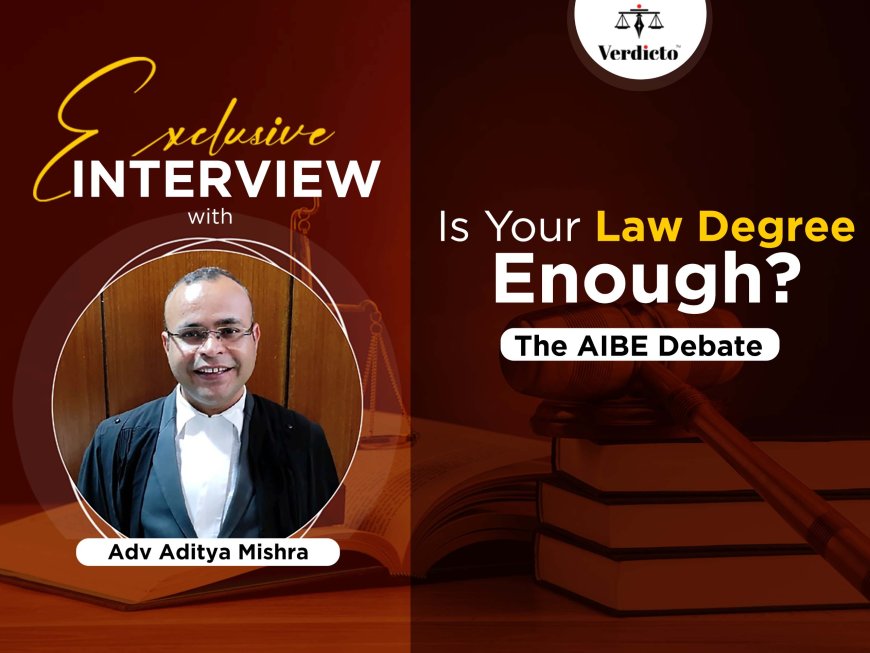Is Your Law Degree Enough? The AIBE Debate
The All India Bar Examination, introduced in 2010 by the BCI, is a post-enrolment certification test. Law graduates must pass it to receive a "Certificate of Practice," which allows them to argue in court. While the objective was to maintain professional standards, the process has come under criticism for lack of uniformity, repeated delays, and administrative lapses.

In a move that has shaken the legal fraternity, several advocates who had been practicing for over a decade have been suspended for failing to clear the All India Bar Examination (AIBE), a mandatory certification introduced by the Bar Council of India (BCI) in 2010. The decision has sparked a nationwide debate on the legality of the AIBE, the accountability of bar councils, and the fate of lakhs collected under the Advocates' Welfare Fund.
In an exclusive and hard-hitting interview with Verdicto, Advocate Aditya Mishra raises serious questions about the enforcement, intent, and transparency surrounding the AIBE and the functioning of the Bar Council.
What is the AIBE?
The All India Bar Examination, introduced in 2010 by the BCI, is a post-enrolment certification test. Law graduates must pass it to receive a "Certificate of Practice," which allows them to argue in court. While the objective was to maintain professional standards, the process has come under criticism for lack of uniformity, repeated delays, and administrative lapses.
The Suspension Controversy
In a major crackdown, the Bar Council of India (BCI) banned the practice of hundreds of lawyers in Rajasthan for not clearing the All India Bar Examination (AIBE) within the required timeframe. Many of these advocates had been practicing for years before their suspension was enforced. The action sparked widespread debate over the legality of the AIBE, the administrative failure of bar councils to act earlier, and the lack of transparency in legal regulatory bodies.
How did these advocates enroll, renew licenses, and appear in court all these years without being flagged? Adv. Aditya Mishra, in the interview, states:“You cannot suddenly wake up after 10 years and say someone's practice is illegal. The Bar Council is equally responsible for this systemic lapse. This is administrative negligence — not just individual fault.”
Is AIBE Constitutionally Valid?
The legality of the AIBE itself is under the scanner. Several petitions filed in courts argue that once a law graduate is enrolled by a State Bar Council, they are entitled to practice. Adv. Mishra notes: “The AIBE’s legality is still pending final adjudication in the Supreme Court. Until then, suspending advocates is both premature and arbitrary.”
Where is the Welfare Fund Money Going?
Advocates across the country contribute significant amounts to the Advocates’ Welfare Fund through various fees and renewals. But few know how that money is being used. There is no public audit or annual report accessible to ordinary lawyers.
Adv. Mishra questions:
“Where are the crores collected under the Welfare Fund? Are they being used for legal aid, pensions, health insurance? Or are they sitting idle — or worse, misused? Transparency is the need of the hour.”
A Broken System?
This controversy has exposed deeper issues within India’s legal regulatory framework, lack of transparency, outdated practices, and arbitrary enforcement of rules.
“Legal reform must begin from within the system. Lawyers must demand accountability from their own councils,” says Mishra.
The Way Forward
-
Audit and Publish Welfare Fund Usage: Bar councils must be made accountable for every rupee collected.
-
Streamlined AIBE Process: If AIBE is to stay, it must be transparent, timely, and fair, not a bureaucratic trap.
-
Awareness for Young Lawyers: Most law graduates are unaware of the rules until it's too late. Legal education needs clarity on post-enrolment requirements.
Verdicto will continue to follow this story closely, bringing you legal insights, expert interviews, and fact-based analysis.
Stay tuned. Because where law meets journalism — truth must prevail.
📌 Follow us on YouTube, Instagram, and Twitter for more updates.







